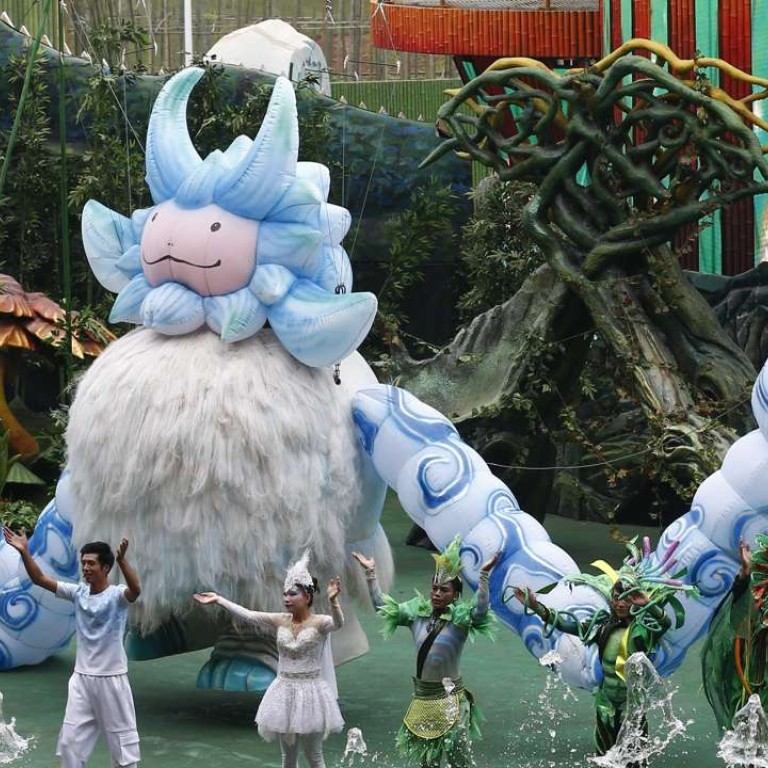
Breaking | Wanda takes on Shanghai Disney with series of new theme parks across China
The property and cinema giant is hoping to open at least seven more parks and become the world’s biggest entertainment and tourism operator
Dalian Wanda Group has thrown down the gauntlet to the Walt Disney Company by opening the first of a series of planned tourist theme parks on the mainland.
The 20-billion-yuan Wanda Cultural Tourism City in Jiulonghu, a new development zone 15km outside Nanchang ( 南昌 ), capital of Jiangxi (江西) province, is the first of at least eight parks that Wanda Group hopes will transform it from the country’s largest private property developer and cinema chain operator into the world’s biggest entertainment and tourism company.
Future sites include Guangzhou, Hefei (合肥), Harbin ( 爾濱 ), Wuxi (無錫), Chengdu (成都) and Guilin (桂林).
Wanda Group chairman Wang Jianlin has made no secret of the fact that he feels Disney was mistaken to enter the mainland market and plans to take the US entertainment giant head on through sheer numbers and focus on Chinese culture.
“The mission of Wanda is to build China’s cultural brand in the world, expanding its influence and say,” Wang said at the opening ceremony of the Nanchang project.
“This Wanda City is the first step,” he said.
The billionaire, regarded as the country’s richest man, is not shy about expressing his contempt for Disney, the world’s largest tourism operator which is opening its first mainland park in Shanghai on June 16.
In a previous speech referring to Disney, Wang said “one tiger is no match for [Wanda’s] pack of wolves” and that his company planned to open 15 Wanda cities on the mainland, and three, perhaps five, overseas by 2020, to become the world’s-leading theme park operator.
Wanda also earlier revealed its goal to record 200 million tourist visits and more than 100 billion yuan (HK$118 billion) in annual tourism revenue from its theme parks by 2020.
Nanchang Wanda City also boasts affordability, with tickets priced at 198 yuan on normal days and 248 yuan on holidays and weekends.
That is nearly half the price of tickets for Shanghai Disneyland, which charges adults 370 yuan on weekdays and 499 yuan on weekends and holidays. This is considered expensive when many people earn just 3,000 yuan a month.
“Disney is an old brand, while Wanda is new,” Wanda spokesman Liu Mingsheng said.
Wang has also described Disney’s vast intellectual property rights as “a burden”. “They are entirely cloning previous intellectual property, cloning previous products, with no innovation,” Wang said.
Industry insiders say that despite the rhetoric, which was in large part aimed to stir publicity, Wanda lacks Disney’s brand power and many decades of experience in running theme parks.
Liu Shulin, a resident of Nanchang who joined thousands of visitors to Wanda City on its opening day, said he was unimpressed with the aquarium.
“I’ve been to many and this one is mediocre at best,” he said. “Its details are rough and the service isn’t good.”
But Shen Xiaoling, an analyst with China Real Estate Information Corporation, a consultancy, said sleekness was not Wanda’s initial aim. Its strength lay in its strong financial profile, a huge domestic market, speedy expansion and above all close ties with local governments, Shen said.
Showcasing the point is Wanda’s ability to buy huge swathes of land very cheaply from local governments, and persuading them to build supporting facilities such as subways.
“Wanda’s projects cater to local governments’ new zone development plans. Consumers here are not that picky,” she said

